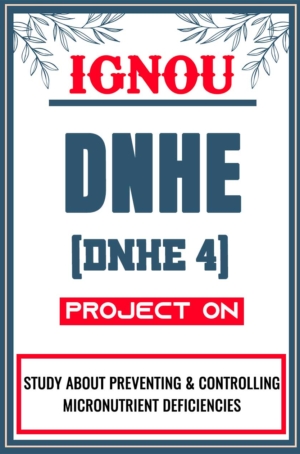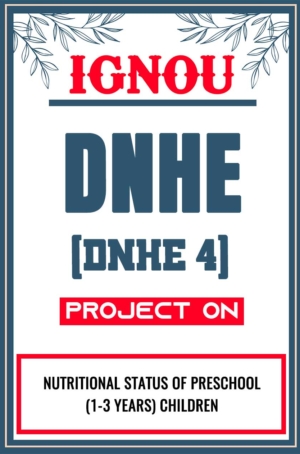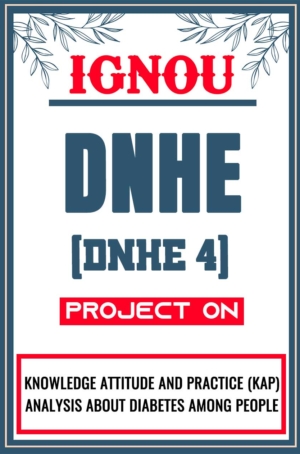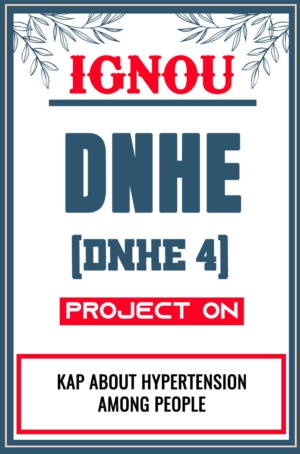Download IGNOU DNHE Project (DNHE 4)
The IGNOU DNHE Project (DNHE 4) is a critical component of the Diploma in Nutrition and Health Education (DNHE) program offered by Indira Gandhi National Open University (IGNOU). This IGNOU DNHE Project (DNHE 4) work provides students with practical experience in the field of nutrition and health education, allowing them to apply theoretical knowledge to real-world situations.
DNHE Project work course (DNHE-04) provides students with an interesting introduction to critical health and nutrition issues. It is a research project that takes a greater degree of work on the part of the student; it needs students to do their own fact-finding for DNHE 4 Synopsis and DNHE 4 Report.
Whatsapp us to get the Personalized (Customized) or Readymade IGNOU DNHE Project Report or IGNOU DNHE Project Synopsis Sample PDF
IGNOU DNHE Project Topics (DNHE 4)
- A Study on Management of Diabetes Mellitus in Xyz City
- A Study on Knowledge, Attitude and Practices (Kap) Analysis of Pregnant Women towards Their Nutritional Status
- Obesity Prevalance among School Children in the Age Group of 13-17 Years
- Nutritional Status of Children & Knowledge, Attitude and Practices among Parents Regarding Dengue Infection in School Children
- Nutritional Awareness and Preferences for Ready to Eat Foods amongst Working and Non-Working Women in Xyz City
- Knowledge, Attitude and Practice (Kap) Analysis of Mothers Regarding Nutritional Status and Diet Intake of Their Children of Age Group 2 To 5 Years
- A Study on Kap (Knowledge, Attitude and Practice) Among Nutrition and Non- Nutrition Students of Xyz City
- Nutritional Status of Preschool (1-3 Years) Children: A Case Study of Slum Areas Of Xyz
What is the process for getting your DNHE 4 topic approved?
The process for getting your DNHE 4 project topic approved involves working with your assigned project counselor and field guide. Here’s a breakdown of the steps:
- Develop your project idea: Consider your interests within nutrition and health education. Browse the suggested themes (I-V) provided by IGNOU or choose your own relevant topic.
- Consult your project counselor and field guide: Discuss your project idea with them. They can offer valuable insights on feasibility, relevance, and potential challenges.
- Prepare a project proposal: This proposal, typically limited to 500-600 words, should outline the following:
- Project Title: Clearly state your chosen topic.
- Objectives: Define what you aim to achieve with your project.
- Target Group: Specify the specific population you’ll be focusing on (e.g., school children, pregnant women, a particular community).
- Methodology: Explain how you plan to conduct your research (surveys, interviews, observations, etc.).
- Work Plan: Outline a timeline for your project activities.
- Ethical Considerations: If applicable, address any ethical concerns related to data collection or participant involvement.
- Obtain signatures: Once your proposal is finalized, get signatures from both your project counselor and field guide indicating their approval.
- Submit the proposal: Submit the completed proposal, following the format specified by your study center (usually Annexure 1), to the Study Center Coordinator. They might require an additional form for project proposal approval.
What should be included in the IGNOU DNHE Project Proposal?
A well-structured IGNOU DNHE project proposal (DNHE 4) should typically include the following sections, keeping the word limit around 500-600 words:
1. Title Page:
- Include your name, enrollment number, program code (DNHE), project title, and study center details.
2. Introduction:
- Briefly introduce the chosen topic within the context of nutrition and health education.
- Highlight the significance of the topic and its potential impact.
3. Objectives:
- Clearly state the specific goals you aim to achieve with your project.
- Be clear and measurable in your objectives.
4. Target Group:
- Specify the population segment you’ll be focusing on for your project.
- This could be school children, a specific age group, a particular community facing a nutritional challenge, etc.
5. Methodology:
- Explain the methods you plan to use to gather information and data for your project.
- This could involve surveys, interviews, focus group discussions, observations, or a combination of these methods.
- Briefly describe the tools you’ll utilize (questionnaires, interview guides, observation checklists, etc.).
6. Work Plan:
- Outline a timeline for your project activities.
- Include a breakdown of tasks, their estimated duration, and any deadlines.
7. Ethical Considerations (if applicable):
- Address any ethical concerns related to data collection, participant confidentiality, or informed consent (if interviews are involved).
8. Expected Outcome:
- Briefly describe the anticipated results and findings of your project.
9. References:
- Include a list of any references you’ve consulted while developing your proposal (textbooks, research papers, online resources).
How is the DNHE-4 project evaluated?
The DNHE-4 project is evaluated based on several criteria to ensure that the project meets the academic and research standards set by the university. Here’s a detailed breakdown of how the project is evaluated:
1. Quality of Research
- Relevance of Topic: The topic should be relevant to the field of nutrition and health education.
- Clarity of Objectives: Objectives should be clearly defined and achievable.
- Literature Review: Comprehensive review of existing literature to provide context and background for the study.
2. Research Methodology
- Appropriateness: The chosen methodology should be suitable for the research objectives.
- Data Collection: Methods of data collection should be systematic and well-documented.
- Data Analysis: Techniques used for analyzing data should be appropriate and correctly applied.
3. Project Report Structure
- Introduction: Clear introduction stating the research problem and objectives.
- Literature Review: Detailed review of relevant literature.
- Methodology: Clear description of research design, data collection methods, and analysis techniques.
- Findings: Presentation of research findings with supporting data.
- Discussion: Interpretation of findings in relation to the research objectives and existing literature.
- Conclusion and Recommendations: Clear conclusion summarizing the research and providing actionable recommendations.
4. Presentation and Formatting
- Clarity and Coherence: The report should be well-organized and logically structured.
- Formatting: Adherence to the prescribed formatting guidelines (font, spacing, margins, headings).
- Citations and References: Proper citation of sources and a complete bibliography following a consistent citation style (e.g., APA, MLA).
5. Originality and Plagiarism
- Original Work: The project should be original and demonstrate the student’s own work.
- Plagiarism Check: The report should be free from plagiarism, and all sources should be properly cited.
6. Viva Voce (Oral Examination)
- Presentation Skills: Ability to present the research clearly and concisely.
- Understanding of Topic: Demonstrating a thorough understanding of the research topic and methodology.
- Response to Questions: Ability to answer questions posed by the examiners effectively.
What are the formatting guidelines for the IGNOU DNHE Project Report?
- Font: Typically, Times New Roman or Arial, size 12
- Spacing: Double-spaced
- Margins: 1 inch on all sides
- Page Numbers: Bottom center
- Headings: Consistent style for all headings and subheadings
- References: Follow a consistent citation style (e.g., APA, MLA)
How important is the literature review section in your IGNOU DNHE Project (DNHE 4)?
The literature review section in your IGNOU DNHE-4 project holds significant importance. Here’s why:
Strengthens Your Project Foundation:
- Demonstrates your understanding of the existing knowledge base on your chosen topic.
- Shows you’ve conducted thorough research and haven’t simply started from scratch.
- Provides context and background information for your project.
Enhances Credibility and Quality:
- By citing relevant research papers, books, and other reliable sources, you add weight to your project and its findings.
- Shows you’ve engaged with the work of other scholars and experts in the field.
- Helps distinguish your work from generic information.
Supports Methodology and Analysis:
- The literature review can help you justify your chosen research methods.
- It allows you to compare your findings with existing research and identify any gaps or discrepancies.
- Provides a framework for interpreting your project’s results in a broader context.
Avoids Reinventing the Wheel:
- You can learn from the research already conducted on your topic and avoid duplicating efforts.
- The literature review can reveal existing solutions or interventions that might inform your own project recommendations.
How can you ensure your data is reliable for your IGNOU DNHE-4 Project?
Ensuring reliable data for your IGNOU DNHE-4 project is essential for drawing sound conclusions. Here are some key strategies you can employ:
Data Collection Methods:
- Choose appropriate methods: Select data collection methods that align with your research objectives. Surveys might be suitable for gathering opinions, while interviews can provide in-depth data. Consider observation or existing data sources if relevant.
- Pilot testing: Conduct a pilot test with a small sample group before full-scale data collection. This helps identify any issues with your methods or questionnaires and allows for refinement.
- Minimize bias: Structure your data collection tools (surveys, interview questions) to minimize bias that might skew your results.
Data Quality Control:
- Accuracy checks: Implement procedures to ensure data accuracy. Double-check data entry for typos or inconsistencies. Consider having another person review your data for errors.
- Data cleaning: Clean your data to identify and address missing values, outliers, or inconsistencies. This might involve correcting errors, removing irrelevant data, or finding appropriate ways to handle missing information.
- Standardization: Ensure consistency in data collection and recording. Use standardized formats and units of measurement throughout your project.
Data Analysis Techniques:
- Appropriate analysis: Choose data analysis techniques that are appropriate for the type of data you’ve collected. Statistical software can be helpful, but ensure you understand the chosen methods and their limitations.
- Triangulation (if applicable): If feasible, consider using triangulation, which involves using multiple data collection methods (e.g., surveys and interviews) to corroborate your findings and enhance their reliability.
Transparency and Documentation:
- Document your methods: Clearly document your data collection procedures, including the tools used, sampling methods, and any challenges encountered. This transparency allows for evaluation of your methods and potential replication of your study.
- Source verification: If using existing data sources (reports, datasets), verify their credibility and reliability. Ensure the data comes from reputable sources and is collected using sound methodologies.
What are some common mistakes to avoid in the IGNOU DNHE Project Report?
- Plagiarism: Always credit original authors and avoid copying.
- Poor Organization: Ensure your report is well-structured and logically organized.
- Inconsistent Formatting: Follow the specified formatting guidelines consistently.
- Lack of Clarity: Write clearly and avoid jargon or overly complex language.
- Ignoring Guidelines: Adhere to all guidelines provided by IGNOU.
Can you include multimedia elements in your IGNOU DNHE Project Report?
Yes, you likely can include multimedia elements in your IGNOU DNHE-4 project report, but it’s advisable to check with your study center for specific guidelines and limitations. Here’s why including multimedia can be beneficial:
- Enhanced Engagement: Images, infographics, and even short video clips can effectively communicate information and make your report more visually appealing.
- Complex Data Presentation: Charts, graphs, and other visual elements can help represent complex data in a clear and understandable way.
- Case Studies: If your project involves case studies, embedding relevant images or short videos might provide a richer context.
Here are some things to consider when incorporating multimedia:
- Relevance: Ensure any multimedia elements directly relate to your project content and enhance understanding. Avoid including irrelevant or decorative visuals.
- Copyright: Make sure you have the copyright or permission to use any multimedia elements included in your report.
- Quality: Use high-quality images, videos, and audio clips that are clear and professional-looking.
- Formatting: Embed multimedia elements seamlessly into your report, ensuring proper alignment and formatting.
- File Size: Be mindful of file size limitations, especially if submitting your report electronically. Large files might slow down loading times or exceed storage restrictions.
Get our expert help for your IGNOU DNHE Project
- Call us or WhatsApp us at: 9958947060, 9354637830
- Visit: SHRICHAKRADHAR.COM
Check the topics and get downloaded the DNHE Project Synopsis and Report Sample PDF
Search the relevant topic below and download the readymade IGNOU DNHE Project Report & IGNOU DNHE Synopsis
Note: These are example IGNOU DNHE Project Synopsis Reports that are already written so that students can learn how to write them. A lot of students might think about getting them. IGNOU doesn’t accept projects that have already been turned in by other students. If you want a project that has never been turned in by another student and that we promise will be approved, WhatsApp us at 9958947060 and include the topic of your project.
-
Sale!

-
Sale!

IGNOU DNHE Project (DNHE 4) Synopsis/Proposal & Project Report/Dissertation in Soft-Copy (Sample-2)
Original price was: ₹499.00.₹149.00Current price is: ₹149.00. -
Sale!

IGNOU DNHE Project (DNHE 4) Synopsis/Proposal & Project Report/Dissertation in Soft-Copy (Sample-3)
Original price was: ₹499.00.₹149.00Current price is: ₹149.00. -
Sale!

IGNOU DNHE Project (DNHE 4) Synopsis/Proposal & Project Report/Dissertation in Soft-Copy (Sample-4)
Original price was: ₹499.00.₹149.00Current price is: ₹149.00. -
Sale!

IGNOU DNHE Project (DNHE 4) Synopsis/Proposal & Project Report/Dissertation in Soft-Copy (Sample-5)
Original price was: ₹499.00.₹149.00Current price is: ₹149.00. -
Sale!

IGNOU DNHE Project (DNHE 4) Synopsis/Proposal & Project Report/Dissertation in Soft-Copy (Sample-6)
Original price was: ₹499.00.₹149.00Current price is: ₹149.00. -
Sale!

IGNOU DNHE Project (DNHE 4) Synopsis/Proposal & Project Report/Dissertation in Soft-Copy (Sample-7)
Original price was: ₹499.00.₹149.00Current price is: ₹149.00. -
Sale!

IGNOU DNHE Project (DNHE 4) Synopsis/Proposal & Project Report/Dissertation in Soft-Copy (Sample-8)
Original price was: ₹499.00.₹149.00Current price is: ₹149.00.
